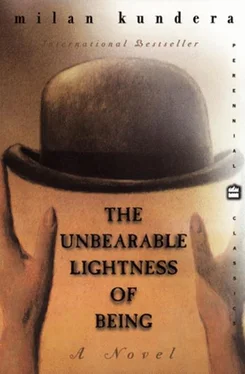Milan Kundera - The Unbearable Lightness of Being
Здесь есть возможность читать онлайн «Milan Kundera - The Unbearable Lightness of Being» весь текст электронной книги совершенно бесплатно (целиком полную версию без сокращений). В некоторых случаях можно слушать аудио, скачать через торрент в формате fb2 и присутствует краткое содержание. Жанр: Современная проза, на английском языке. Описание произведения, (предисловие) а так же отзывы посетителей доступны на портале библиотеки ЛибКат.
- Название:The Unbearable Lightness of Being
- Автор:
- Жанр:
- Год:неизвестен
- ISBN:нет данных
- Рейтинг книги:3 / 5. Голосов: 2
-
Избранное:Добавить в избранное
- Отзывы:
-
Ваша оценка:
- 60
- 1
- 2
- 3
- 4
- 5
The Unbearable Lightness of Being: краткое содержание, описание и аннотация
Предлагаем к чтению аннотацию, описание, краткое содержание или предисловие (зависит от того, что написал сам автор книги «The Unbearable Lightness of Being»). Если вы не нашли необходимую информацию о книге — напишите в комментариях, мы постараемся отыскать её.
The Unbearable Lightness of Being — читать онлайн бесплатно полную книгу (весь текст) целиком
Ниже представлен текст книги, разбитый по страницам. Система сохранения места последней прочитанной страницы, позволяет с удобством читать онлайн бесплатно книгу «The Unbearable Lightness of Being», без необходимости каждый раз заново искать на чём Вы остановились. Поставьте закладку, и сможете в любой момент перейти на страницу, на которой закончили чтение.
Интервал:
Закладка:
Tomas was on the point of telling him emphatically that he would neither write nor sign any text whatever, but at the last moment he changed his tone and said mildly, I'm no illiterate, am I? Why should I sign something I didn't write myself?
Very well, then, Doctor. Let's do it your way. You write it up yourself, and we'll go over it together. You can use what you've just read as a model.
Why didn't Tomas give the secret policeman an immediate and unconditional no?
This is what probably went through his head: Besides using a statement like that to demoralize the nation in general (which is clearly the Russian strategy), the police could have a concrete goal in his case: they might be gathering evidence for a trial against the editors of the weekly that had published Tomas's article. If that was so, they would need his statement for the hearing and for the smear campaign the press would conduct against them. Were he to refuse flatly, on principle, there was always the danger that the police would print the prepared statement over his signature, whether he gave his consent or not. No newspaper would dare publish his denial. No one in the world would believe that he hadn't written or signed it. People derived too much pleasure from seeing their fellow man morally humiliated to spoil that pleasure by hearing out an explanation.
By giving the police the hope that he would write a text of his own, he gained a bit of time. The very next day he resigned from the clinic, assuming (correctly) that after he had descended voluntarily to the lowest rung of the social ladder (a descent being made by thousands of intellectuals in other fields at the time), the police would have no more hold over him and he would cease to interest them. Once he had reached the lowest rung on the ladder, they would no longer be able to publish a statement in his name, for the simple reason that no one would accept it as genuine. Humiliating public statements are associated exclusively with the signatories' rise, not fall.
But in Tomas's country, doctors are state employees, and the state may or may not release them from its service. The official with whom Tomas negotiated his resignation knew him by name and reputation and tried to talk him into staying on. Tomas suddenly realized that he was not at all sure he had made the proper choice, but he felt bound to it by then by an unspoken vow of fidelity, so he stood fast. And that is how he became a window washer.
7
Leaving Zurich for Prague a few years earlier, Tomas had quietly said to himself, Es muss sein! He was thinking of his love for Tereza. No sooner had he crossed the border, however, than he began to doubt whether it actually did have to be. Later, lying next to Tereza, he recalled that he had been led to her by a chain of laughable coincidences that took place seven years earlier (when the chief surgeon's sciatica was in its early stages) and were about to return him to a cage from which he would be unable to escape.
Does that mean his life lacked any Es muss sein!, any overriding necessity? In my opinion, it did have one. But it was not love, it was his profession. He had come to medicine not by coincidence or calculation but by a deep inner desire.
Insofar as it is possible to divide people into categories, the surest criterion is the deep-seated desires that orient them to one or another lifelong activity. Every Frenchman is different. But all actors the world over are similar-in Paris, Prague, or the back of beyond. An actor is someone who in early childhood consents to exhibit himself for the rest of his life to an anonymous public. Without that basic consent, which has nothing to do with talent, which goes deeper than talent, no one can become an actor. Similarly, a doctor is someone who consents to spend his life involved with human bodies and all that they entail. That basic consent (and not talent or skill) enables him to enter the dissecting room during the first year of medical school and persevere for the requisite number of years.
Surgery takes the basic imperative of the medical profession to its outermost border, where the human makes contact with the divine. When a person is clubbed violently on the head, he collapses and stops breathing. Some day, he will stop breathing anyway. Murder simply hastens a bit what God will eventually see to on His own. God, it may be assumed, took murder into account; He did not take surgery into account. He never suspected that someone would dare to stick his hand into the mechanism He had invented, wrapped carefully in skin, and sealed away from human eyes. When Tomas first positioned his scalpel on the skin of a man asleep under an anesthetic, then breached the skin with a decisive incision, and finally cut it open with a precise and even stroke (as if it were a piece of fabric-a coat, a skirt, a curtain), he experienced a brief but intense feeling of blasphemy. Then again, that was what attracted him to it! That was the Es muss sein! rooted deep inside him, and it was planted there not by chance, not by the chief's sciatica, or by anything external.
But how could he take something so much a part of him and cast it off so fast, so forcefully, and so lightly?
He would respond that he did it so as not to let the police misuse him. But to be quite frank, even if it was theoretically possible (and even if a number of cases have actually occurred), it was not too likely that the police would make public a false statement over his signature.
Granted, a man has a right to fear dangers that are less than likely to occur. Granted, he was annoyed with himself and at his clumsiness, and desired to avoid further contact with the police and the concomitant feeling of helplessness. And granted, he had lost his profession anyway, because the mechanical aspirin-medicine he practiced at the clinic had nothing in common with his concept of medicine. Even so, the way he rushed into his decision seems rather odd to me. Could it perhaps conceal something else, something deeper that escaped his reasoning?
8
Even though he came to love Beethoven through Tereza, Tomas was not particularly knowledgeable about music, and I doubt that he knew the true story behind Beethoven's famous Muss es sein? Es muss sein! motif.
This is how it goes: A certain Dembscher owed Beethoven fifty florins, and when the composer, who was chronically short of funds, reminded him of the debt, Dembscher heaved a mournful sigh and said, Muss es sein? To which Beethoven replied, with a hearty laugh, Es muss sein! and immediately jotted down these words and their melody. On this realistic motif he then composed a canon for four voices: three voices sing Es muss sein, es muss sein, ja, ja, ja, ja! (It must be, it must be, yes, yes, yes, yes!), and the fourth voice chimes in with Heraus mit dem Beutel! (Out with the purse!).
A year later, the same motif showed up as the basis for the fourth movement of the last quartet, Opus 155. By that time, Beethoven had forgotten about Dembscher's purse. The words Es muss sein! had acquired a much more solemn ring; they seemed to issue directly from the lips of Fate. In Kant's language, even Good morning, suitably pronounced, can take the shape of a metaphysical thesis. German is a language of heavy words. Es muss sein! was no longer a joke; it had become der schwer gefasste Entschluss (the difficult or weighty resolution).
So Beethoven turned a frivolous inspiration into a serious quartet, a joke into metaphysical truth. It is an interesting tale of light going to heavy or, as Parmenides would have it, positive going to negative. Yet oddly enough, the transformation fails to surprise us. We would have been shocked, on the other hand, if Beethoven had transformed the seriousness of his quartet into the trifling joke of a four-voice canon about Dembscher's purse. Had he done so, however, he would have been in the spirit of Parmenides and made heavy go to light, that is, negative to positive! First (as an unfinished sketch) would have come the great metaphysical truth and last (as a finished masterpiece)-the most frivolous of jokes! But we no longer know how to think as Parmenides thought.
Читать дальшеИнтервал:
Закладка:
Похожие книги на «The Unbearable Lightness of Being»
Представляем Вашему вниманию похожие книги на «The Unbearable Lightness of Being» списком для выбора. Мы отобрали схожую по названию и смыслу литературу в надежде предоставить читателям больше вариантов отыскать новые, интересные, ещё непрочитанные произведения.
Обсуждение, отзывы о книге «The Unbearable Lightness of Being» и просто собственные мнения читателей. Оставьте ваши комментарии, напишите, что Вы думаете о произведении, его смысле или главных героях. Укажите что конкретно понравилось, а что нет, и почему Вы так считаете.












